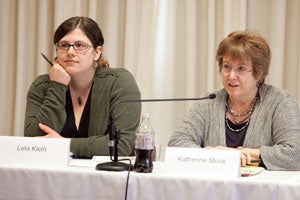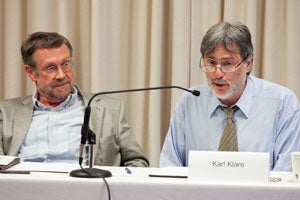On February 25, Unbound: Harvard Journal of the Legal Left presented “Local 1330 v. U.S. Steel: 30 Years Later.” Conference organizers chose to focus on Local 1330 because the case demonstrates that workers can be treated as collateral damage in the corporate quest for greater profits. Co-moderator Harris Freeman, Western New England College of Law professor, said that its lessons are particularly relevant today as labor unions and fundamental workers’ rights are being challenged in Wisconsin and face similar risks in other states. The conference was also moderated by Temple University Beasley School of Law professor Brishen Rogers and SEIU Law Fellow Lela Klein.
The case, decided in 1980, was brought by Local 13330 and 1307 of the United Steel Workers of America, who had a collective bargaining contract with the United States Steel Corporation. U.S. Steel decided to close two plants due to aging equipment and general unprofitability. The union sought to keep the plants operating, even offering to purchase the factories from the company, due to the devastating effect that their closing would have on the local communities. In a decision that was upheld by the Sixth Circuit, the district court held that it had no authority to require a corporation to continue operations when its officers had decided it was in its best interest to close, it could not order the corporation to sell the factory to the union, and that the union and the community had no property interest in the factory.
The conference was organized around the themes of history, pedagogy and legacy, and the three panels reflected these themes. It opened with a lunchtime screening of “Shout Youngstown,” a documentary about the closings of three steel plants in Youngstown, Ohio, between 1976 and 1980.
The “History: Remembering Local 1330” panel featured panelists who were instrumental in the unfolding of the case: Staughton Lynd, lead counsel for Local 1330, and Mike Stout, grievance chairperson for Local 1397. They provided historical context, described the litigation and preceding events, and situated the case within the broader framework of the political economy of deindustrialization.

“The current sub-prime crises has made it abundantly clear to most people that the creation of a property right is not a self-regarding act. The banking and mortgage industries created a market of sub-prime mortgages…and when the housing bubble burst, these property rights had the minor side effect of wrecking the world economy,” he said. “It’s apparent now that regulations of property are needed to prevent and respond to the third party effects associated with arrangements that are indifferent to the rights and needs of other people and to the nation as a whole.”
Michael Fischl, University of Connecticut School of Law professor, discussed Local 1330 as a contracts case, and Northeastern University School of Law professor Karl Klare focused on how the case can be used in training and empowering law students who wish to become social justice lawyers.

The “Legacy: Labor Today” panel featured Katherine Stone, UCLA School of Law professor, Mark Brenner, director of Labor Notes, and Haeya Yim, policy associate at the New York Department of Labor Bureau of Immigrant Worker Rights. The panelists spoke to the changes that have taken place in legal and political landscapes since Local 1330 was decided, and how those differences shape the labor market, legal strategies, and labor organizing today. Stone said that Local 1330’s legacy is the link it established between the interests of workers and the well being of the community.
“Despite changes in human resource practices, individuals today still depend on jobs for livelihoods, and communities depend on workers having jobs for their sustainability,” she said. “It is necessary to continue advocating and articulating the link between communities and jobs. Not necessarily based on a right to a particular job, but rather to jobs in general.”
